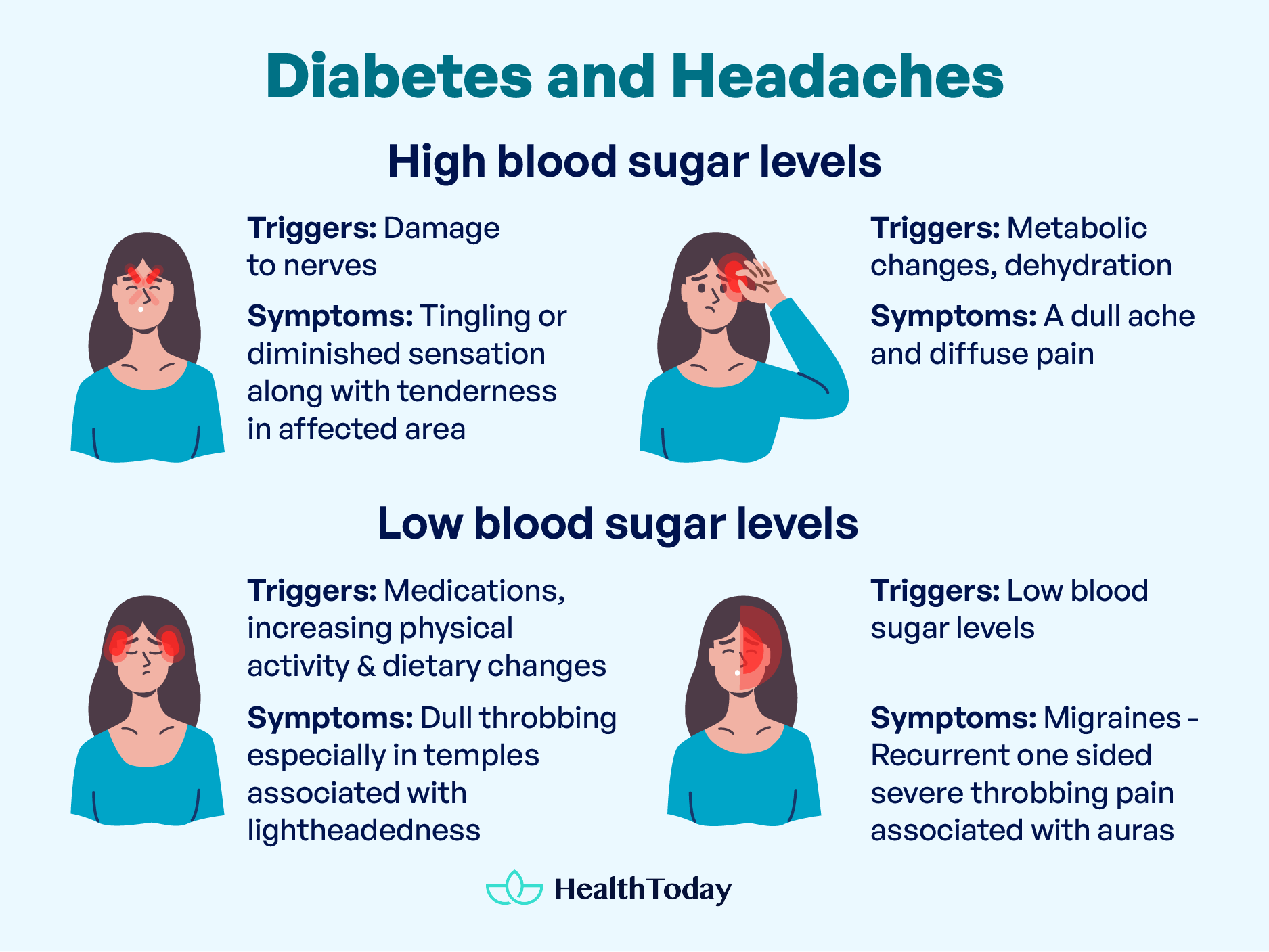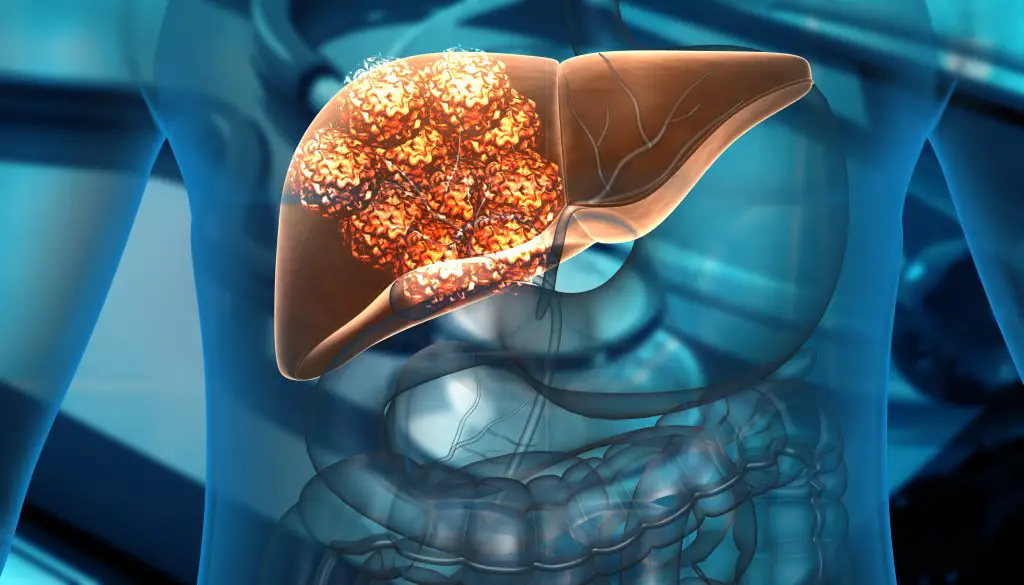Table of Contents
This article talks about the relationship between diabetes and headaches. It also explains how changes in blood sugar levels are linked to headaches. Have you ever wondered what a sugar headache feels like? We have simplified this for you.
We explain how high and low blood sugars affect migraines. The article also gives some tips to get rid of sugar headaches along with different types of headaches, as well as some natural ways that can help you with sugar headaches. Lastly, we will explore the alarming signs of diabetes and answer the question: “Does diabetes cause headaches?”
Diabetes and headaches: What is the connection?
Fluctuations in blood glucose levels in diabetic patients due to lack of control over their blood sugar levels can cause headaches. The term sugar headache encompasses headaches due to high as well as low sugar levels in diabetics, as described below:
Can high blood sugar cause headaches?
Yes, high blood sugar levels definitely cause headaches (1). Sugar is the main source of energy for the brain, as our mind relies on glucose as its major source of fuel (2). Though it may sound odd that if there is too much sugar available, there should be so much fuel, and our minds should work extra instead of experiencing headaches.
Hyperglycemia, i.e., high sugar levels in diabetes, originates from impaired glucose usage and disturbance in hormone levels. These changes result in various bodily changes, such as dehydration and changes in blood’s osmolarity. These complex mechanisms can result in an achy feeling in our head, along with blurry vision and various other symptoms (1, 3).
Another important mechanism by which high blood glucose levels cause headaches is by causing damage to our nerves. Nerves are an essential component of our nervous system and play a part in relaying information to the whole body (4). Damage to nerves that supply our head can cause headaches, especially in the occipital area, which is the back of the head (5).

What does a high blood sugar headache feel like?
This article has explained two different ways by which sugar levels beyond a specific limit can cause headaches; you can say there are two kinds of sensations felt by a person with uncontrolled blood glucose levels.
If high sugar levels are causing headaches by inducing metabolic changes and dehydration, the pain can feel like a dull ache with diffuse pain. On occasion, it can be throbbing, sharp and constant (3).
But suppose the headache is due to damage to nerves by hyperglycemia. In that case, it may make you feel tingling or diminished sensation along with severe tenderness from the slightest touch in the affected area. There can also be a background ache. (5)
Diabetics, low blood sugar levels and headaches
When we mention sugar headaches in diabetics, it is not only high glucose levels; it also includes low glucose blood levels. It sounds strange to link hypoglycemia with diabetes; well, it’s not the topic of attention here, but there are various reasons a diabetic can experience low glucose levels, including medications, increasing physical activity without modification in medications, and dietary changes. (6)
Sugar headaches also include hypoglycemic headaches in diabetics; it feels like dull throbbing, especially in temples, associated with lightheadedness(7)
Blood sugar and migraines
Migraines are just one kind of headache, but they have characteristics that make them different from ordinary day-to-day headaches. They include recurrent one-sided severe throbbing pain, sometimes associated with auras (visual disturbances) (8).
There is strong evidence that there are shared genetic factors between diabetes and migraine headaches; various research has been done in this domain. People with diabetes have a higher risk of developing migraines and vice versa (9).
While occasional isolated high glucose levels do not trigger migraine, low sugar levels are a known predisposing factor for migraines. Again, as described above, hypoglycemia can also occur in diabetics due to various reasons; it can also induce migraine (9).
High blood sugar headache remedy
To treat the headache associated with fluctuations in blood sugar levels, we need to treat the root cause, which is the stabilization of blood glucose levels. A good management of your diabetes can help you get rid of sugar headache (10).
Lifestyle changes, such as adequate sleep, reducing stress, minimizing alcohol or smoking, optimizing dietary intake by cutting excess sugars, avoiding processed sugars, opting for whole grains and raw sugars, and controlling diabetes with medications can improve headaches. Regular physical activity and adequate hydration also aid in rectifying headaches related to diabetes (10).
Headache from eating sugar
Some people observe having headaches after eating excess sugar. Most of them are those who have an underlying history of migraine headaches. Migraines can be triggered by the high sugar content of food in some people. On occasion, sugars, i.e., carbohydrate-enriched meals, consumed by diabetics can cause postprandial reactive hypoglycemia, which also causes headaches. Postprandial hypoglycemia means after meals, blood glucose levels decrease due to complex mechanisms related to diabetes and its medications (9, 11).
How to get rid of a sugar headache
To get rid of a sugar headache, you need to control your diabetes properly. When we talk about control of diabetes, it’s not about controlling high sugar levels. The low sugar levels also result from low food intake, anti-diabetic medications, and excessive exercise relative to food intake. Some important points to follow are (10):
- Avoid processed sugars
- Eat at scheduled intervals
- Take adequate water
- Exercise regularly
- Compliance with medications
- Do not skip meals
Other causes of headaches beyond diabetes
There are two types of headache: (1) Primary, due to problems in pain-controlling structures in the head and does not occur because of underlying disease; (2) secondary, which occurs due to some other medical condition (12).
Various kinds of primary headaches include:
- Tension-type headaches resulting from stress
- Migraines, which are recurrent throbbing headaches associated with or without auras
- Cluster headaches due to dysfunction of a part of the nervous system
- Exercise headaches
These primary headaches can be triggered due to:
- Stress
- Lack of adequate sleep
- Low food intake
- Dehydration
- Alcohol excess
Secondary headaches are due to underlying medical conditions; other than diabetes, certain medical problems particularly associated with headaches are as follows:
- Ear infections
- Nasal infections
- Brain tumors
- Blood clots in vessels of the brain
- Trauma
- Vasculitis
- Brain infections
- Carbon monoxide poisoning
And the list is unending (12).
Diabetes and dehydration
Diabetes can cause dehydration. In fact, some deadly complications of diabetes are caused by dehydration resulting from high blood sugar levels. On the other hand, dehydration can also lead to high blood glucose levels in diabetics (13, 14).
People with diabetes have more sugar in their blood. The kidneys ultimately remove this excess sugar. While removing excess sugar, the body’s water content is also excreted more. This results in low water in the body, i.e., dehydration.
On the other hand, if you get dehydrated for any reason, low water in your body results in relatively more sugar concentration and triggers hyperglycemic symptoms, especially in diabetics. Hence, high glucose can lead to dehydration, and dehydration can also lead to high glucose in the body (13, 14).
Signs and symptoms suggestive of dehydration secondary to diabetes (3,13):
- Headache
- Being thirsty
- Blurry vision
- Fatigue
- Frequent urination
- Weight loss
Natural ways to relieve headaches for diabetics
Natural ways to relieve headaches in diabetic people are actually all the natural ways that one can control sugar in diabetics. The most important step among these simple home remedies is dietary modification. Non-fat or low-fat dairy products, along with whole grains and lean meats, are allowed. Cutting carbohydrates is not recommended to prevent hypoglycemic episodes. Instead, fruits like apples, berries, oranges, grapes, and vegetables like potatoes, corn, tomatoes, green peas are recommended (15).
Regular exercise and adequate hydration, along with proper blood sugar level charting, also helps with diabetes and, ultimately, sugar headaches (16, 10).
Avoiding low glucose levels due to overtreatment can help prevent migraines in people with diabetes, as hypoglycemia is one of the major predisposing factors of migraine headaches (9).
Taking moderate amounts of water is important for managing mild symptoms such as headaches and severe complications of diabetes. Mild dehydration can manifest as headache or diabetes lips, i.e., dry, cracked lips, dry mouth, and difficulty swallowing (3, 17).
Early warning signs of diabetes
Type one diabetes mellitus usually manifests early, but type two diabetes mellitus does not show symptoms until late in the disease. Some early warning signs of diabetes are as follows (18, 19):
- Excessive thirst: people with diabetes experience relative dehydration due to loss of water while excreting extra sugar, which manifests as excessive thirst
- Peeing more than usual: diabetics urinate more frequently in order to clear the blood from extra glucose
- Weight reduction: diabetics cannot utilize the available calories, which causes weight loss, especially in patients with type 1 diabetes
- Tiredness: as people cannot utilize available glucose due to hormonal problems, fatigue results
- Increase appetite despite weight loss: despite weight loss, patient feels increased appetite in an attempt to replete calories.
- Frequent infections such as gum or vaginal infections: chronic hyperglycemia cause impairment in immunity resulting in various infections
- Ketones in urine: excess glucose in diabetics converts into ketones that are excreted in urine; it is a marker that warrants further evaluation for diagnosis of diabetes
- Poor healing sores and foot ulcers
- Impaired vision
Why do I get a headache after eating sugar?
Eating sugar in excess can sometimes cause headaches for some people. Most of the time, sugar triggers migraines, a kind of recurrent, one-sided throbbing headache. The majority who experience headaches through increased intake of sugars are those who have underlying migraines and are unaware of them (8, 9).
Another possible mechanism is more sugars lead to post-meal hypoglycemia due to complex mechanisms in diabetics related to its medications, ultimately causing headaches secondary to hypoglycemia (11).
Can bad headaches be a sign of diabetes?
How do you get rid of a diabetic headache?
Can diabetes cause daily headaches?
There is not much evidence regarding daily headaches and diabetes, but the point to keep in mind is that the culprit is fluctuating sugar levels, which can lead to headaches, either high sugar due to lack of control or low sugar due to overtreatment. As long as your blood glucose levels are maintained, headaches will not occur (7, 1).
Are headaches a symptom of prediabetes?
How do I know if I am prediabetic?
Prediabetes is a condition that cannot be classified as normal. Still, you cannot label it as diabetes, i.e., fasting glucose levels are between 100 and 126 mg/dl. (20). Most prediabetics have no symptoms; hence, overweight or obese people above 35 years of age should undergo screening annually (21). Rarely, it can present symptoms like diabetes, such as fatigue, increased thirst, appetite, weight loss, etc (20).
Summary
Sugar is our body’s main energy fuel, especially the brain, and variations in its levels cause headaches. Fluctuations in blood glucose levels, either high sugar levels in diabetics or hypoglycemia due to uncontrolled diabetes or overtreatment, can result in sugar headaches. A sugar headache feels like a dull ache or throbbing sensation, especially in the temples or occipital regions. Hypoglycemia has a stronger association with migraines; hyperglycemia has a genetic link with migraine headaches.
Lifestyle changes, regular exercise, sugar charting, dietary changes, and compliance with medications help to get rid of sugar headaches. Other common causes of headaches include primary, i.e., tension, cluster, migraines, and secondary headaches resulting from various medical conditions. Early warning signs of diabetes include increased thirst, frequent urination and weight loss. Diabetes can lead to dehydration, which has varying presentations from headaches to severe complications.

















Comments
0